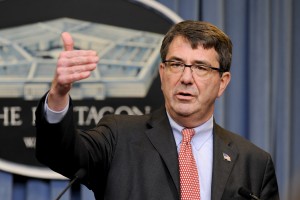
Defense secretary admits US to fall far short of Iraqi recruit goal
Defense Secretary Ash Carter acknowledged Wednesday that the U.S. will fall far short of its goal of training 24,000 Iraqi recruits by this fall, telling Congress the effort has been slowed by a “lack of trainees.”
Carter told the House Armed Services Committee they’ve only gotten enough recruits to train about 7,000 Iraqi security forces, plus 2,000 counterterrorism service personnel.
“We simply haven’t received enough recruits,” Carter said.
Carter spoke just days after the White House announced it was sending up to 450 more U.S. troops to a new base in Anbar province of western Iraq, mainly to advise the Iraqis on planning and execution of a counteroffensive to retain Ramadi, the provincial capital.
Part of that effort includes attracting and training new recruits. Carter said the U.S. had initially envisioned training 24,000 security forces at four sites by this fall.
While they no longer expect to reach that goal, Carter did say they’re already seeing an “inflow” of Sunni fighters seeking training — considered a vital component in the effort to take on the Islamic State, which is Sunni. Carter also said building a “capable and motivated” Iraqi ground force is critical.
Carter and Gen. Martin Dempsey, chairman of the Joint Chiefs of Staff, faced skeptical questions from lawmakers, some of whom claim the U.S. still doesn’t have a clear strategy.
“The situation in the Middle East has deteriorated substantially in the last six years,” committee Chairman Mac Thornberry, R-Texas, said. “What’s worse, there appears to be nothing coming from the White House to change that trajectory.”
He questioned whether 450 more U.S. troops could “turn the tide” against the Islamic State.
Carter and Dempsey described a nine-point strategy for fighting ISIS, including airstrikes but also humanitarian aid and efforts to stop the flow of foreign fighters.
Asked whether the 450 extra troops will make a difference, Carter said the numbers are not as significant as the location, which is in the heart of Sunni territory.
The U.S. is pushing for a more inclusive government in Baghdad that is representative of Sunnis, Shiites and Kurds, Iraq’s three major ethnic groups.
“As I’ve told Iraqi leaders, while the United States is open to supporting Iraq more than we already are, we must see a greater commitment from all parts of the Iraqi government,” Carter said, adding that the Iraqi leaders understand the need to empower a multisectarian Iraqi force as well as addressing organizational and leadership failures.
Carter testified along with Dempsey, who is finishing a four-year term as chairman of the Joint Chiefs of Staff.
Dempsey has expressed the view that the U.S. needs to be patient and not give up on the Iraqi government’s ability to fight IS. Many Republicans in Congress, however, are leery and say the U.S. should not rely on the Iraqis.
“There is a sense that we are at a particularly perilous time and that U.S. policy and strategy are inadequate,” said Thornberry.
Rep. Adam Smith, the committee’s ranking Democrat, cautioned that U.S. military might alone will not defeat IS.
“We can drop 200,000 U.S. troops in the middle of this. It won’t solve the problem,” Smith said.
Carter’s testimony was interrupted by an anti-war protester who shouted “We need a political solution.”
The Associated Press contributed to this report.





Leave a Reply